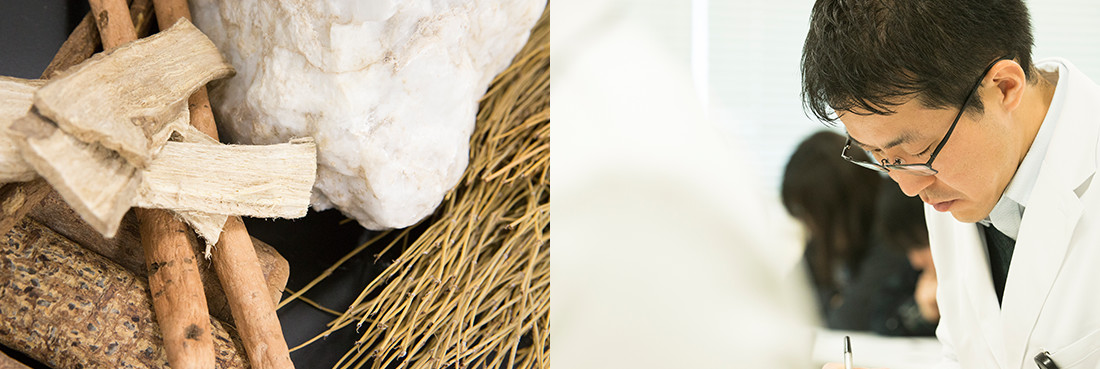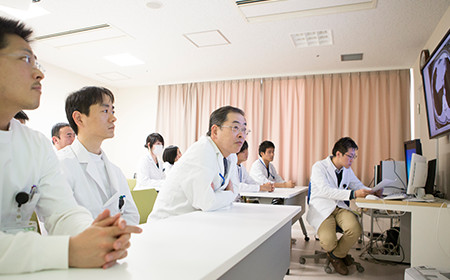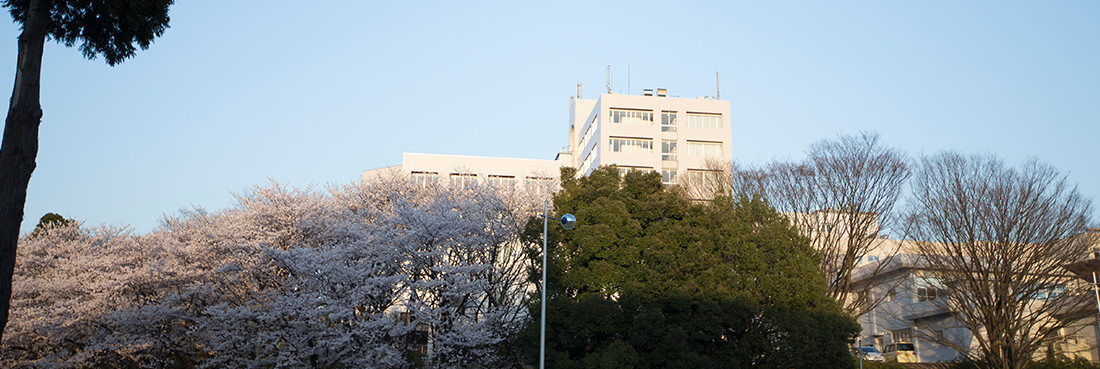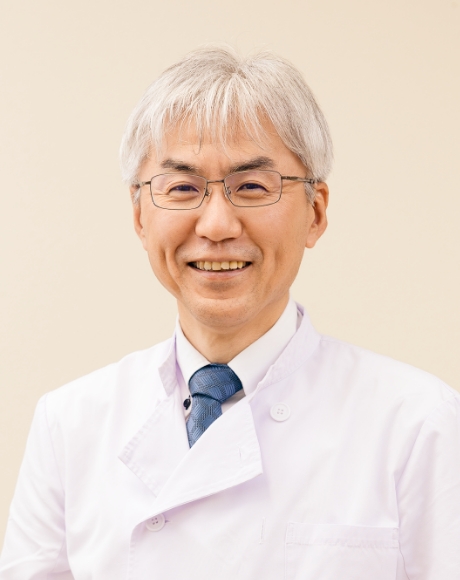Education
| Introduction to WAKAN-IYAKU-GAKU (Kampo medicine) |
Japanese Oriental (Kampo) medicine |
History of medicine and pharmacy |
Clinical training of Japanese Oriental (Kampo) medicine |
Clinical training of Japanese Oriental (Kampo) medicine (selective) |
|---|---|---|---|---|
| Medical students, pharmacy students, nursing students in the 2nd grade |
Medical students in the 3rd grade |
Medical students in the 4th grade |
Medical students in the 5th-6th grade |
Medical students in the 5-6th grade |
| 1 lecture, 5 practical works | 10 lectures | 8 lectures | 5 days (per one student) | 4 weeks (per one student) |
Research Outline
- Improving effects of Kampo medicines and their action mechanisms on microcirculation, vascular endothelial dysfunction and arteriosclerosis, etc.
- Protective effects of Kampo medicines and their action mechanisms on cell and organ damages induced by neurological, hypertensive and diabetic diseases, etc.
- Immunomodulating and defensive effects of Kampo medicines and their action mechanisms on immunological, allergic and infectious diseases, etc.

Research Achievement List
- PDF2022
- PDF2021
- PDF2020
- PDF2019
- PDF2018
- PDF2017
- PDF2016
- PDF2015
- PDF2014
- PDF2013
- PDF2012
- PDF2011
- PDF2010
- PDF2009
- PDF2008
- PDF2007
- PDF2006
- PDF2005
- PDF2004
- PDF2003
- PDF2002
- PDF2001
- PDF2000
- PDF1999
- PDF1998
- PDF1997
- PDF1996
- PDF1995
- PDF1994
- PDF1993
- PDF1992
- PDF1991
- PDF1990
- PDF1989
- PDF1988
- PDF1987
- PDF1986
- PDF1985
- PDF1984
- PDF1983
- PDF1982
- PDF1981
- PDF1980
WHO Collaborating Centre for Traditional Medicine

- Director / Head:
Professor Yutaka Shimada - Institution:
Department of Japanese Oriental Medicine, Graduate School of Medicine and Pharmaceutical Sciences, University of Toyama - Date of Designation:
23/Apr/1988 - Last Redesignation:
19/Mar/2020 - Expiry:
19/Mar/2024
- Terms of Reference (19/Mar/2020 - 19/Mar/2024):
1. As requested by WHO and under its leadership, providing support WHO in assisting Member States to establish and strengthen incident reporting systems for traditional medicine;
2. As per WHO’s request, provide technical support to WHO in improving evidence-based traditional medicine practice in Member States;
3. Under WHO’s leadership, providing technical support to WHO in developing the Regional Action Plan on traditional medicine and for implementing the WHO strategies on traditional medicine. -
WHO-CC Report
PDFKampo medicines and incident reporting system in Japan: Role of PMDA
PDFKampo medicines in clinical practice guidelines Ver.2
-
Recent Activities as a WHO Collaborating Centre for Traditional Medicine[March 2021 - March 2022]
Activity 1: Patient safety and incident reporting systems in traditional medicine
An English review article titled "Adverse effects of Kampo medicines", which was written by Professor Shimada, was published in an international journal (Intern Med. 2022 Jan 1;61(1):29-35. doi: 10.2169/internalmedicine.6292-20.). A report titled "Kampo medicines and incident reporting system in Japan: Role of PMDA" was posted on the website of our center (http://www.med.u-toyama.ac.jp/wakan/file/kampo-en-item01.pdf).
Activity 2: Clinical practice guidelines on traditional medicine in Japan
A report titled "Kampo medicines in clinical practice guidelines", which contained essential points of the clinical practice guidelines for functional dyspepsia, gastroesophageal reflux disease and irritable bowel syndrome in Japan, was posted on the website of our center (http://www.med.u-toyama.ac.jp/wakan/file/kampo-en-item02.pdf).
Activity 3: Provision of technical inputs that may inform the WHO regional action plan on traditional medicine
Not applicable
Activity 4: Provision of technical support to improve information system for traditional medicine
Our centre reviewed a draft "WHO technical document on clinical research in traditional and complementary medicine".
Interactions or collaborations with WHO and other WHO collaborating centres
Not applicable[March 2020 - March 2021]
Activity 1: Patient safety and incident reporting systems in traditional medicine
In Japan, the Ministry of Health, Labor, and Welfare's website discloses adverse drug-event data including Kampo medicines that have been obtained from medical personnel reports investigated by the Pharmaceutical and Medical Devices Agency (PMDA). Using these data, we investigated adverse events associated with ethical Kampo formulations and reported in an international academic journal in 2019 (DOI: org/10.1155/2019/1643804). In 2020, the head of the WHO collaborating centre, Professor Shimada, wrote a review article on the adverse effects of Kampo medicines in Japanese and it was published in a Japanese domestic journal. In 2021, an English review article on adverse effects of Kampo medicines, which is written by Professor Shimada, will be published in an international journal.
Activity 2: Clinical practice guidelines on traditional medicine in Japan
Not applicable
Activity 3: Provision of technical inputs that may inform the WHO regional action plan on traditional medicine
Not applicable
Activity 4: Provision of technical support to improve information system for traditional medicine
Not applicable
Interactions or collaborations with WHO and other WHO collaborating centres
The head of the WHO collaborating centre, Professor Shimada attended the Meeting of WHO Collaborating Centres in the Western Pacific Region (web meeting) on 25 August 2020. Professor Shimada reported the profile of our centre in "Medemiru WHO (Visual WHO)" No. 72 (2020. Spring) published by the Koeki Shadan Hojin Nihon WHO Kyokai (Friends of WHO JAPAN) in Japanese. - Terms of Reference (19/Mar/2016 - 19/Mar/2020):
In cooperation with the Institute of Natural Medicine, University of Toyama,
1. To assist WHO and its Member States in identifying and establishing patient safety incidents reporting systems for traditional medicine;
2. To support the implementation of WHO's traditional medicine strategies in strengthening evidence of traditional medicines and its application in the clinical practice;
3. To assist WHO in disseminating information on efficacy and safety of traditional medicine in the Member States of the Region. - Activities as a WHO Collaborating Centre for Traditional Medicine
[March 2019 - March 2020]
Activity 1: Patient safety in traditional medicine
In Japan, the Ministry of Health, Labor, and Welfare’s website discloses adverse drug-event data that have been obtained from medical personnel reports investigated by the Pharmaceutical and Medical Devices Agency. Using these data, we investigated adverse events associated with ethical Kampo formulations. Reports of adverse events associated with ethical Kampo formulations from the domestic adverse-event data were obtained from July 30, 2003 to March 31, 2018. There were 4,232 reported adverse events associated with ethical Kampo formulations. The numbers of events by category were as follows: events related to liver injury, 1,193; lung injury, 1,177; pseudoaldosteronism, 889; mesenteric phlebosclerosis, 223; drug eruption, 185; and others, 565. Among events related to both liver injury and lung injury, approximately 70% were suspected to be induced by Kampo formulations containing Scutellariae Radix. The pseudoaldosteronism-related events, which are induced by Glycyrrhizae Radix, included several events related to muscle injury, heart failure, and arrhythmia. Events related to mesenteric phlebosclerosis, believed to be induced by long-term use of Kampo formulas containing Gardeniae Fructus, increased remarkably during the study period. We reported the above contents in an international academic journal (DOI: org/10.1155/2019/1643804).Activity 2: Evidence-based traditional medicine
In the past year, we reported the following research outcomes. We reported kihito, a traditional Japanese Kampo medicine, improves cognitive function in Alzheimer’s disease patients by an open-label, crossover designed clinical trial (DOI: org/10.1155/2019/4086749). In addition, we reported that Cistanche tubulosa (Schenk) Wight extract enhances hindlimb performance and attenuates myosin heavy chain IId/IIx expression in cast-immobilized mice (DOI: org/10.1155/2019/9283171).Activity 3: Information of traditional medicine
In the past year, we updated the information.Activity 4: Monitoring and assessing TM morbidity and service
In the past year, we reported the information about the regulatory system for traditional and complementary medicine practitioners in Japan in collaboration with Oriental Medicine Research Center, Kitasato University, according to a request from the technical officer in WHO-WPRO.Interactions or collaborations with other WHO collaborating centres
The head of the WHO collaborating centre, professor Shimada attended the Collaborating Meeting for Japanese WHO Collaborating Centres, Tokyo, Japan, on 6 September 2019, and made a presentation about activities. Professor Shimada attended the 1st Joint Symposium of WHO Collaborating centers for Traditional Medicine in SEARO and WPRO, Bangkok, Thailand, on 13 November 2019, and made a presentation about the efficacy of a kampo formula, keishibukuryogan.[March 2018 - March 2019]
Activity 1: Patient safety in traditional medicine
We already investigated the incident reports related to Kampo medicines filed in Toyama University Hospital from May 2007 to April 2017, and reported it in an international academic journal in 2017 (DOI: 10.1186/s12906-017-2051-2). In the past year, we reported the contents of this investigation entitled of “Patient safety incident reports related to traditional Japanese Kampo medicines: medication errors and adverse drug events in a university hospital for a ten-year period” in the 7th Joint Symposium of WHO Collaborating Centres for Traditional Medicine in Japan and Korea, Seoul, Korea, on 1 November 2018.Activity 2: Evidence-based traditional medicine
In the past year, we reported the incidence of Kampo medicine-induced interstitial pneumonia by 10 year retrospective study at our department as follows (DOI: 10.1002/tkm2.1211). In Japan, interstitial pneumonia is described as an adverse drug event in the drug package insert of some prescription Kampo formulations, and many of the Kampo formulas that induce interstitial pneumonia contain Scutellariae Radix (SR). However, the incidence of Kampo medicine-induced interstitial pneumonia has not been sufficiently studied. As a result of our investigation, three patients developed Kampo medicine-induced interstitial pneumonia in the 3590 patients who received Kampo medications (incidence, 0.08%). The causal Kampo formulas in all three of these cases contained SR. For the 1111 patients who were prescribed SR-containing formulas, the incidence of Kampo medicine-induced interstitial pneumonia was 0.27%. In conclusion, although the incidence is not high, physicians should keep in mind that Kampo formulas, particularly SR-containing formulas, might cause Kampo medicine-induced interstitial pneumonia. In addition, we reported shikonin, a natural naphthoquinone derivative isolated from the traditional medical herb Lithospermum erythrorhizon, induces an anti-tumor effect on murine mammary cancer via p38-dependent apoptosis (DOI: 10.3892/or.2019.6966).Activity 3: Information of traditional medicine
In 2017, we renewed our website (http://www.med.u-toyama.ac.jp/wakan/) in order to disclose the information on efficacy and safety of Kampo medicines obtained from our research. We put the lists of all our past annual research activities including academic papers on our website, and also introduced the recent activities as a WHO Collaborating Centre for Traditional Medicine. Then, we updated the information last year.Activity 4: Monitoring and assessing TM morbidity and service
The activity on this workplan has been placed on hold in the past year. For your information, the head of the WHO collaborating centre, professor Shimada participated in teleconference concerning the improving data on traditional medicine in WPRO on 17 June 2016, and explained about the problems of collecting data on traditional medicine in Japan.Interactions or collaborations with other WHO collaborating centres
The head of the WHO collaborating centre, professor Shimada attended the Collaborating Meeting for Japanese WHO Collaborating Centres, Tokyo, Japan, on 14 April 2018, and made a presentation in collaboration with Oriental Medicine Research Centre, Kitasato University, and discussed future collaboration. Professor Shimada attended the 7th Joint Symposium of WHO Collaborating Centres for Traditional Medicine in Japan and Korea, Seoul, Korea, on 1 November 2018, and made a presentation and also exchanged opinions concerning safety issues of traditional medicine. Professor Shimada and assistant professor Watari attended the 3rd Regional Forum of WHO Collaborating Centres in the Western Pacific, Ho Chi Minh, Viet Nam, on 22-23 November 2018, and made a poster presentation concerning recent activities of our centre and also discussed future activities and collaboration.[March 2017 - March 2018]
Activity 1: Patient safety in traditional medicine
We selected incident reports related to Kampo medicines filed in Toyama University Hospital from May 2007 to April 2017, and investigated them in terms of medication errors and adverse drug events. We discovered 108 Kampo medicine-related incident reports (103 incidents). Of those, 99 incidents were classified as medication errors (77 administration errors, 15 dispensing errors, and 7 prescribing errors), and four were adverse drug events, namely Kampo medicine-induced interstitial pneumonia. According to the incident severity classification system recommended by the National University Hospital Council of Japan, of the 99 medication errors, 10 incidents were classified as level 0 (an error occurred, but the patient was not affected) and 89 incidents were level 1 (an error occurred that affected the patient, but did not cause harm). Of the four adverse drug events, two incidents were classified as level 2 (patient was transiently harmed, but required no treatment), and two incidents were level 3b (patient was transiently harmed and required substantial treatment). We reported the above contents in an international academic journal (DOI: 10.1186/s12906-017- 2051-2).Activity 2: Evidence-based traditional medicine
In the past year, we reported a case of non-alcoholic fatty liver disease satisfactorily treated with traditional Japanese Kampo medicine (DOI: 10.1002/tkm2.1083), and a case of recurrent drug-induced liver injury caused by the incidental readministration of a Kampo formula containing Scutellariae Radix (DOI: 10.2169/internalmedicine.0275-17). The following is the background, purpose and progress of the ongoing research. Kampo medicines are integrated into the Japanese national health care system. Unfortunately, not a few Kampo medicine-induced interstitial pneumonia (KMIIP) have been reported. Also, there are ethical Kampo formulations in which interstitial pneumonia is described as an adverse drug event in the package inserts in Japan. However, the incidence of KMIIP has not been sufficiently studied. We planned to clarify the incidence of KMIIP in Toyama University Hospital for ten years (2008 – 2017). The study design was approved by the Ethics Committee in University of Toyama in November 2017, and we have already undertaken the research.Activity 3: Information of traditional medicine
We renewed our website (http://www.med.u-toyama.ac.jp/wakan/) in order to disclose the information on efficacy and safety of Kampo medicines obtained from our research. We put the lists of all our past annual research activities including academic papers on our website, and also introduced the recent activities as a WHO Collaborating Centre for Traditional Medicine.Activity 4: Monitoring and assessing TM morbidity and service
The activity on this workplan has been placed on hold in the past year. For your information, in the previous year, we reported as follows. The head of the WHO collaborating centre, professor Shimada, participated in teleconference concerning the improving data on traditional medicine in WPRO on 17 June 2016, and explained about the problems of collecting data on traditional medicine in Japan.Interactions or collaborations with other WHO collaborating centres
The head of the WHO collaborating centre, professor Shimada attended the Collaborating Meeting for Japanese WHO Collaborating Centres, Tokyo, Japan, on 23 April 2017, and made a presentation and discussed future collaboration. The head of the WHO collaborating centre, professor Shimada, associate professor Fujimoto and assistant professor Watari attended the 6th Joint Symposium between WHO Collaborating Centres for Traditional Medicine in Korea and Japan, Tokyo, Japan, on 16 June 2017, and made two presentations, and also exchanged opinions on future activities concerning patient safety on traditional medicine.[March 2016 - March 2017]
Activity 1: Patient safety in traditional medicine
We planned to survey and analyze the incident reports related to Kampo medicines in Toyama University Hospital for ten years (May 2007 – April 2017). The study design was already approved by the Ethics Committee in University of Toyama in November 2016. We are now picking up incident reports which are related to Kampo medicines, and analyzing them.Activity 2: Evidence-based traditional medicine
We elucidated the effects of Kampo medicines and action mechanisms as follows in the past year: (1) A Kampo formula, shichimotsukokato, protects progression of hypertension-induced renal dysfunction in spontaneously hypertensive rats; (2) Kampo formulas, tokishakuyakusan and ogikenchuto, suppress dermal sclerosis in bleomycin-induced murine scleroderma; (3) Cytosolic aspartate aminotransferase, a direct binding protein of kamikihito, a Kampo formula, regulates axon growth.Activity 3: Information of traditional medicine
We have been putting the lists of our research activities including academic papers every year on our website. We are now planning to renew our website for disclosure of further information on the effectiveness and safety of Kampo medicines.Activity 4: Monitoring and assessing TM morbidity and service
The head of the WHO collaborating centre, professor Shimada, participated in teleconference concerning the improving data on traditional medicine in WPRO on 17 June 2016, and explained about the problems of collecting data on traditional medicine in Japan.Collaboration with WHO
The head of the WHO collaborating centre, professor Shimada, and associate professor Fujimoto attended the Second Regional Forum of WHO Collaborating Centres in the Western Pacific, Manila, Philippines, 28-29 November 2016.Interactions or collaborations with other WHO collaborating centres
The head of the WHO collaborating centre, professor Shimada, assistant professor Nogami and assistant professor Watari attended the 5th Joint Symposium between WHO Collaborating Centres for Traditional Medicine in Korea and Japan in Daejeon, Korea, on 20 May 2016, and made two presentations.

